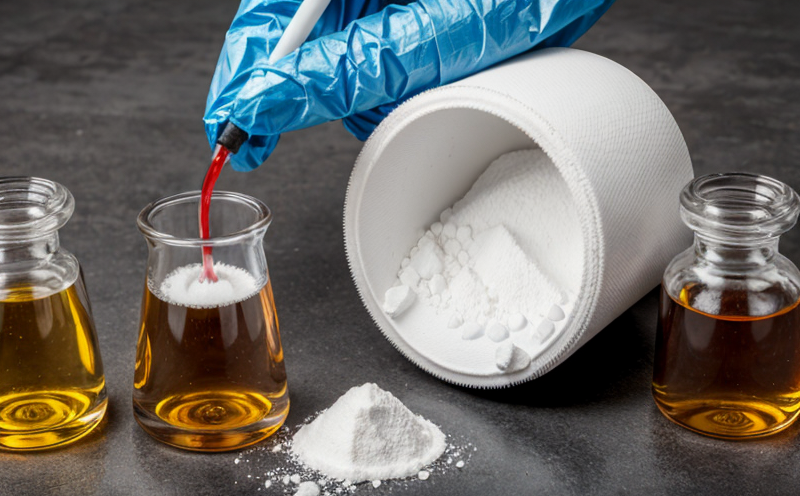GOST 12 1 007 Hazardous Substances Compliance Testing
The GOST 12.1.007 standard, published by the State Committee of Standardization of Russia in 1986, specifies requirements for the control and limitation of hazardous substances and impurities in electrical and electronic products used within the Russian Federation.
This testing ensures that manufacturers adhere to stringent environmental regulations aimed at minimizing adverse effects on human health and the environment. The standard aims to protect end-users from exposure to harmful chemicals such as lead, mercury, cadmium, hexavalent chromium, polybrominated biphenyls (PBB), and polybrominated diphenyl ethers (PBDE).
The testing process involves detailed analysis of the chemical composition of materials used in electronic components. This includes printed circuit boards, connectors, insulating materials, and other parts that could potentially come into contact with users. The laboratory uses state-of-the-art analytical equipment to ensure precise measurement and accurate reporting.
Preparation of specimens for testing is critical to achieving reliable results. Specimens are typically cut from larger assemblies or procured specifically for the test. The laboratory ensures that samples are representative of the entire production batch, taking into account variations in material composition and manufacturing processes.
The analytical methods used comply with international standards such as ISO 17025 and EN 45001, ensuring high-quality testing results. Key instruments utilized include atomic absorption spectrophotometers (AAS), inductively coupled plasma mass spectrometers (ICP-MS), and gas chromatographs equipped with mass detectors.
The testing process involves several stages: initial sample preparation, analysis using the appropriate instrumentation, interpretation of data, and final reporting. Results are compared against the specified limits outlined in GOST 12.1.007 to determine compliance. Non-compliance may lead to product recall or modification to meet regulatory requirements.
Compliance with this standard is essential for businesses operating within the Russian market. Failure to comply can result in legal penalties and damage to brand reputation. The testing process ensures that products are safe, reliable, and environmentally responsible.
The importance of GOST 12.1.007 compliance cannot be overstated. It not only protects end-users but also promotes sustainable practices within the electronics industry. By adhering to these standards, manufacturers contribute to a healthier environment by reducing pollution and waste associated with hazardous substances.
In summary, GOST 12.1.007 Hazardous Substances Compliance Testing is crucial for ensuring product safety and environmental responsibility in Russian markets. This testing aligns with broader sustainability goals, fostering trust among consumers and stakeholders.
Why It Matters
The GOST 12.1.007 standard plays a pivotal role in safeguarding public health by regulating the use of hazardous substances in electronics. By adhering to these stringent requirements, manufacturers can ensure that their products meet international standards and contribute positively to environmental conservation.
Compliance with this standard is particularly important for businesses operating within or exporting to Russia. It demonstrates a commitment to ethical business practices and enhances the reputation of companies involved in electronics manufacturing. Additionally, it helps prevent potential legal issues arising from non-compliance.
The testing process involves rigorous analysis using advanced instrumentation, ensuring accuracy and reliability. This not only builds customer confidence but also supports regulatory compliance across various jurisdictions.
By embracing GOST 12.1.007 Hazardous Substances Compliance Testing, businesses can foster innovation while maintaining high standards of quality and safety. It encourages the development of safer products that are both environmentally friendly and sustainable.
In conclusion, compliance with this standard is essential for maintaining a competitive edge in the electronics industry. It ensures that companies remain at the forefront of technological advancement while upholding ethical business practices.
International Acceptance and Recognition
GOST 12.1.007 is widely recognized within Russia, ensuring consistent application across all regions. The standard has been adopted by various regulatory bodies, making it a reliable benchmark for assessing the safety of electronic products.
International acceptance of GOST standards, including GOST 12.1.007, is growing as more countries seek to harmonize their regulations with global best practices. This trend fosters greater cooperation between nations and promotes the exchange of knowledge and expertise in electronics manufacturing.
The laboratory adheres strictly to international standards such as ISO 17025 and EN 45001, ensuring that all tests conducted are accurate and reliable. These certifications add credibility to the results obtained during GOST 12.1.007 Hazardous Substances Compliance Testing.
By aligning with international standards, companies gain access to broader markets and enhanced opportunities for growth. This global recognition also helps build trust among customers who value product safety and environmental responsibility.
In summary, the acceptance of GOST 12.1.007 within Russia and its growing international recognition underscore its importance in ensuring product safety and promoting sustainable practices across the electronics industry.
Environmental and Sustainability Contributions
GOST 12.1.007 Hazardous Substances Compliance Testing significantly contributes to environmental protection by reducing exposure to harmful chemicals in electronic products. By adhering to these standards, manufacturers can minimize the ecological footprint of their operations.
The testing process helps identify and eliminate hazardous substances from production processes, thereby promoting cleaner manufacturing practices. This shift towards greener technologies not only benefits the environment but also enhances public health by reducing exposure to toxic materials.
Through rigorous adherence to GOST 12.1.007, companies can contribute to sustainable development goals set forth by various international organizations. These efforts align with broader global initiatives aimed at addressing climate change and promoting responsible resource management.
The laboratory’s commitment to sustainability extends beyond testing; it also involves continuous improvement in analytical methods and instrumentation to achieve more precise results. This ongoing dedication ensures that the latest scientific advancements are incorporated into the testing process, further enhancing its effectiveness.
In conclusion, GOST 12.1.007 Hazardous Substances Compliance Testing plays a crucial role in fostering environmentally friendly practices within the electronics industry. By embracing these standards, companies can contribute to a healthier planet while maintaining high levels of product quality and safety.





